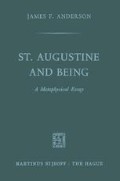Abstract
Augustine’s doctrine of participation is intimately tied in with his teaching concerning the divine Ideas, which in turn is linked closely to his entire theory of creation, knowledge, truth, analogy, being. But it is the first connection with which we are presently concerned. For Augustine, the Ideas are the uncreated archetypes of every species and of every individual thing created by God;1 by sharing in them unequally and hierarchically all things possess their proper perfection.2 Since the Ideas subsist in the mind of the Creator, they necessarily participate in His own attributes; like Him they are eternal, immutable, necessary.3 Now things simultaneously enjoy two modes of existence: one in their own natures; the other in the Ideas.4 If this is the teaching of the Bible, it is also, according to Augustine, the doctrine of Plotinus. For Augustine tells us that having for the first time in his life read certain treatises of Plotinus he discovered in them, in so many words, the very God of Christianity, with all His essential attributes:5 Plotinus’s One is equivalent to God the Father; his Intelligence (voũς) is the Son, the Word announced in St. John’s Prologue, “by Whom all things were made.”
Access this chapter
Tax calculation will be finalised at checkout
Purchases are for personal use only
Preview
Unable to display preview. Download preview PDF.
References
Book of Eighty-Three Questions, q. 46, 1-2 (PL 33, 29-31).
Cf. The City of God, XII, 2 (PL 41, 350); Unfinished Literal Commentary on “Genesis,” XVI, 57 (PL 34, 24); Sermon II, 8.9 (PL 38, 31-32); Retractions, I, 26 (PL 32, 624-630).
Book of Eighty-Three Questions, loc. cit.
On St. John’s Gospel, I, 17 (PL 35, 1387); On the True Religion, XXII, 42 (PL 34, 140); On “Genesis” Against the Manicheans, I, 8.13 (PL 34, 179).
Confessions, VII, 9.13 (PL 32, 740); The City of God, X, 23 (PL 41, 300).
Enneads, V, 1.6; in Ennéades (ed. Bréhier, Paris: Société d’Edition “Les Belles Lettres,” 1925). Translations made by me from this work.
Enneads, V, 2.1.5
Enneads, V, 5.10.
Enneads, V, 3.7; V, 4.9; VI, 4.12.
Enneads, VI, 5.4. The derivation of all things from the One Plotinus describes as a kind of overflow neads, V, 2.1).
Enneads, III, 8.10-11.
Enneads, III, 8.10.
Enneads, V, 2.2.
Enneads, V, 5.9.
Enneads, VI, 4.8.
Enneads, V, 1.7.
Enneads, VI, 4.11.
E.g., by F. Thonnard, Oeuvres de saint Augustin VI: Dialogues philosophiques, III: “De l’âme à Dieu,” in Bibliothèque Augustinienne, VI (Paris: Desclée, 1952), PP. 525-527; same author: “Caractères platoniciens de l’ontologie augustinienne,” in Augustinus Magister (Paris: Études Augustiniennes, 1954) I, p. 321. See especially Augustine’s A Literal Commentary on “Genesis” IV, 12.22 (PL 34, 304).
“Ex ipso enim caelum et terra, quia ipse fecit ea; non autem de ipso, quia non de substantia sua.” On the Nature of the Good, I (PL 42, 551); cf. Incomplete Work Against Julian V, 42 (PL 45, 1478-79).
On the Christian Way of Life, I, 4.6 (PL 32, 1313).
Cf. St. Thomas, Summa Contra Gentiles, I, 22; II, 52, II 8.
Cf. St. Augustine, On the Nature of the Good, III (PL 42, 553).
Cf. St. Thomas, Summa Theologiae, I, 45, 4, ad 1; In VIII Phys., 1.2, n. 5; De. Pot., III, 1, ad 17.
The City of God, XII, 2 (PL 41, 359); cf. Sermon XXIX, 1 (PL 38, 185); Commentary on Psalm CXXXIV, 3 (PL 37, 1740).
That is why contrary interpretations, however plausible at first glance, are in the last analysis inadmissible. E.g., see A. Gardeil, O.P. La structure de l’âme et l’expérience mystique (Paris: Lecoffre, 1927), II, p. 321, n. 1, and p. 325).
On Freedom of Choice, II, 17.45 (PL 32, 1264).
Augustine, On the Manichean Way of Life, II, 1 (PL 32, 1345).
Confessions, XIII, 31.46 (PL 32, 865).
Confessions, loc. cit.
The City of God, VIII, 6 (PL 41, 231); see above Chapter V.
E.g., see Against the Adversary of the Law and the Prophets, I, 8 (PL 42, 609).
The Book of Eighty-Three Questions, q. 46, 2 (PL 33, 30-31).
It may be remarked that the verbs “to make” (facere), “to establish (condere), “to form” (formare), and “to create” (creare) all refer to God’s efficient causation of things. Cf. On Freedom of Choice, II, 17.45-56 (PL 32, 1265); Confessions, XI, 4.6 (PL 32, 311); A Literal Commentary on “Genesis,” IV, 20.37 (PL 34, 310).
The City of God, XII, 25 (PL 41, 375).
It is noteworthy that in his treatment of exemplarity (De Ideis), in the Summa Theologiae, St. Thomas Aquinas expressly follows the doctrine of Augustine as laid down in his Book of Eighty-Three Questions, q.46; Aquinas, Summa Theologiae, I, 15, 1-3.
Author information
Authors and Affiliations
Rights and permissions
Copyright information
© 1965 Martinus Nijhoff, The Hague, Netherlands
About this chapter
Cite this chapter
Anderson, J.F. (1965). Participation. In: St. Augustine and being. Springer, Dordrecht. https://doi.org/10.1007/978-94-011-9447-1_7
Download citation
DOI: https://doi.org/10.1007/978-94-011-9447-1_7
Publisher Name: Springer, Dordrecht
Print ISBN: 978-94-011-8655-1
Online ISBN: 978-94-011-9447-1
eBook Packages: Springer Book Archive

